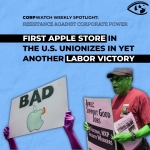Socially Conscious Investors File Amicus Brief with Supreme Court in Nike v. Kasky
Nike's Position Threatens Securities Regulation
Domini Social Investments LLC today announced that it
has filed an amicus brief with the U.S. Supreme Court that supports
San Francisco activist Marc Kasky in his effort to hold Nike
accountable for its statements concerning the company's use of
sweatshop labor.
Kasky argues that Nike's statements should be considered
"commercial speech" akin to advertising, and therefore subject to
California's consumer protection statutes, while Nike maintains that
they are "noncommercial" or "political speech" because they touch on
matters of public concern, and therefore benefit from stricter
protection under the First Amendment.
In its own brief, however, Nike concedes that "virtually everything a company does is ultimately intended to improve its financial bottom line." Nike has also conceded that allegations about sweatshop practices contributed to its disappointing financial performance in 1997 and 1998.
"Both of these concessions are important, and in our view, demonstrate that these types of statements should rightly be considered commercial speech," said Adam Kanzer, General Counsel and Director of Shareholder Advocacy for Domini Social Investments. "These statements were not made during a debate about political philosophy - they were made by a company defending its reputation and its bottom
line."
Domini believes that Nike v. Kasky is a critical case for all
investment firms that practice socially responsible investing (SRI).
Domini Social Investments is the manager of the Domini Social Equity
Fund (NASDQ: DSEFX), the nation's oldest and largest socially and
environmentally screened index fund.
"The SRI community depends upon the accurate flow of corporate
social and environmental performance data," said Mr. Kanzer. "All
investors depend on government regulators to ensure that information
from corporations is provided on a timely and accurate basis. If any
of this information is deemed to be 'political speech,' it will
severely undercut these regulatory efforts. Nike's definition of
political speech -- any commercial speech that also touches upon
matters of public concern -- is alarmingly broad, potentially
affecting nearly every aspect of a corporation's business, from
treatment of stock options to compliance with environmental
regulations.
"It is important to note that this case has no bearing on Nike's
actual practices regarding its overseas contractors, or whether its
statements were in fact false or misleading," Mr. Kanzer continued.
"It addresses only the constitutional question of whether companies
like Nike can claim full First Amendment protection for public
statements regarding their own business practices that also touch upon
matters of public concern."
The principal author of Domini's amicus curiae or "friend of the
court" brief is Cynthia A. Williams, Associate Professor of Law at the
University of Illinois College of Law. The brief is co-authored by
Michael R. Siebecker, Adjunct Assistant Professor at Hunter College.
KLD Research & Analytics, Domini's social research provider, and
Harrington Investments, a Northern California-based social investment
firm, also signed onto the brief. James Pfander, Prentice R. Marshall
Professor of Law at the University of Illinois College of Law, was
counsel of record.
Domini's involvement in Nike v. Kasky follows its successful
campaign for new rules by the Securities and Exchange Commission
requiring mutual funds and investment advisers to disclose their proxy
voting policies and voting records. This is the first brief Domini has
filed with the Supreme Court.
Professor Williams said, "Our brief asks the Court to recognize as
a legal principle that we ought to treat companies' statements about
social and environmental facts precisely as we treat their statements
of financial facts. These factors are critical to investors and
consumers, but they are only valuable if they are true. A broad ruling
in Nike's favor would seriously undermine the SEC and other
regulators' abilities to ensure that these statements are accurate and
not misleading."
According to John Harrington, president and CEO of Harrington
Investments, "Corporations, certainly including Nike, spend hundreds
of millions of dollars on advertising and public relations to sell
their products and establish their trade name, logo or brand. A
corporation's statements about its own business practices are clearly
commercial speech and should never be confused with the freedom of
speech guaranteed to individuals by the First Amendment of the U.S.
Constitution. Corporations have a duty to speak in a way that is
accurate and not misleading, and they should not be given free rein to
use the First Amendment to evade that duty."
Domini's Argument
Domini argues that granting full First Amendment protection to
corporate speech would undercut disclosure and reporting requirements
imposed by the Securities and Exchange Commission, and would make it
easier for companies to sidestep antifraud regulations. Domini's brief
maintains that a ruling in favor of Nike could have serious
implications "at a time when restoring investor confidence in the
markets is crucial."
Domini also argues that Nike's position would threaten investors'
ability to obtain information from corporations on issues of public
concern, such as information about use of child labor, toxic releases,
or expensing stock options. Because the U.S. Supreme Court has struck
down laws compelling political speech, corporations could claim that
compelled disclosure of noncommercial information is unconstitutional.
This may also threaten shareholders' ability to file shareholder
resolutions on social, environmental or corporate governance matters
(because the SEC might not have the authority to compel corporations
to include such "political" speech in their proxy statements). Domini,
Harrington, and many other socially responsible investors regularly
file such resolutions each year.
Supporters of Nike's position have argued that to regard
corporations' statements on their environmental and social performance
as commercial speech would have a chilling effect on their willingness
to disclose such information. Nike itself has refused to release its
most recent report on corporate social responsibility.
Domini, however, maintains that companies like Nike will continue
to discuss their practices because it is in their interests to do so.
This information is demanded by consumers, federal regulators,
nonprofit organizations, some national governments, and by socially
responsible investors and research organizations.
Nike has argued that it has a right to defend itself when its
labor practices are attacked. In its brief, Domini argued "of course
Nike or any other company must be able to respond to criticisms of
their labor policies by providing facts about those policies ....Yet
that reassurance needs to be based on truthful, accurate and
non-misleading information. Nike or any other company should not be
able to 'plead the First' so that the truth of the facts they assert
about their social and environmental records cannot be tested in
litigation -- just as they would not be able to plead the First to
preclude an examination of their statements of fact about their
financial results of operation or about product quality, price or
safety."
Domini pointed out that Nike's position could have implications
for financial statements as well: "Indeed, given recent events, that
financial statements are accurate is itself a matter of public
concern, suggesting that on Nike's theory even statements of fact
about a company's financial results would not be commercial speech."
Background of the Case
Nike, along with other corporations, was criticized in the late
1990s for using sweatshop factories in Asia to manufacture its running
shoes and other products. In 1998, California consumer Marc Kasky sued
Nike under California statutes prohibiting false and misleading
advertising.
Kasky challenged statements Nike had made to newspaper editors,
university professors, and investors, such as that the company paid
"on average, double the minimum wage as defined in countries where its
products are produced" and that its workers "are protected from
physical and sexual abuse."
California state law allows anyone to sue a company for "false
advertising" in statements that are deemed to be "commercial speech."
Commercial speech receives a far lower level of protection under the
First Amendment than political speech.
California state and appellate courts agreed with Nike that its
statements were protected as noncommercial speech. The California
Supreme Court, however, ruled in Kasky's favor, holding that Nike's
statements are "commercial speech for the purposes of applying state
laws barring false and misleading commercial messages." Nike then
appealed the case to the U.S. Supreme Court. The Court is scheduled to
hear oral arguments on April 23.
In 1997 Nike became the first of two companies to be removed from
the Domini 400 Social Index(SM) because of concerns over its
international labor standards. (Wal-Mart was dropped for the same
reason in 2001.) The Index is maintained by KLD. The Domini Social
Equity Fund is a fully replicating index fund based on the Index.
About Domini Social Investments
Domini manages more than $1.3 billion in assets for individual and
institutional investors seeking to create positive change in society
by integrating social and environmental criteria into their investment
decisions. Its flagship fund, the Domini Social Equity Fund (NASDQ:
DSEFX), is the nation's oldest and largest socially responsible index
fund. Additional information on Domini Social Investments is available
on the firm's website, www.domini.com. A copy of Domini's amicus brief may be downloaded at www.domini.com/common/pdf/Amicus-Brief-4-03.pdf.
About Harrington Investments
Harrington Investments, Inc. (HII) is a registered investment
adviser, managing assets for individual and institutional clients that
require a comprehensive social and environmental as well as a
financial criteria portfolio management and investment service. HII
manages approximately $120 million in assets. HII not only manages
socially screened portfolios, but introduces shareholder resolutions
on issues of public concern and discusses such issues with corporate
managers.
About KLD Research & Analytics
Headquartered in Boston, Massachusetts, KLD Research & Analytics
Inc. supplies social investment research, benchmarks, compliance, and
consulting services to leading investment institutions worldwide. KLD
is the creator of SOCRATES, a comprehensive online social research
database, and the Domini 400 Social Index(SM), the established
benchmark for socially screened portfolio performance.
- 180 Media & Entertainment
- 204 Manufacturing


